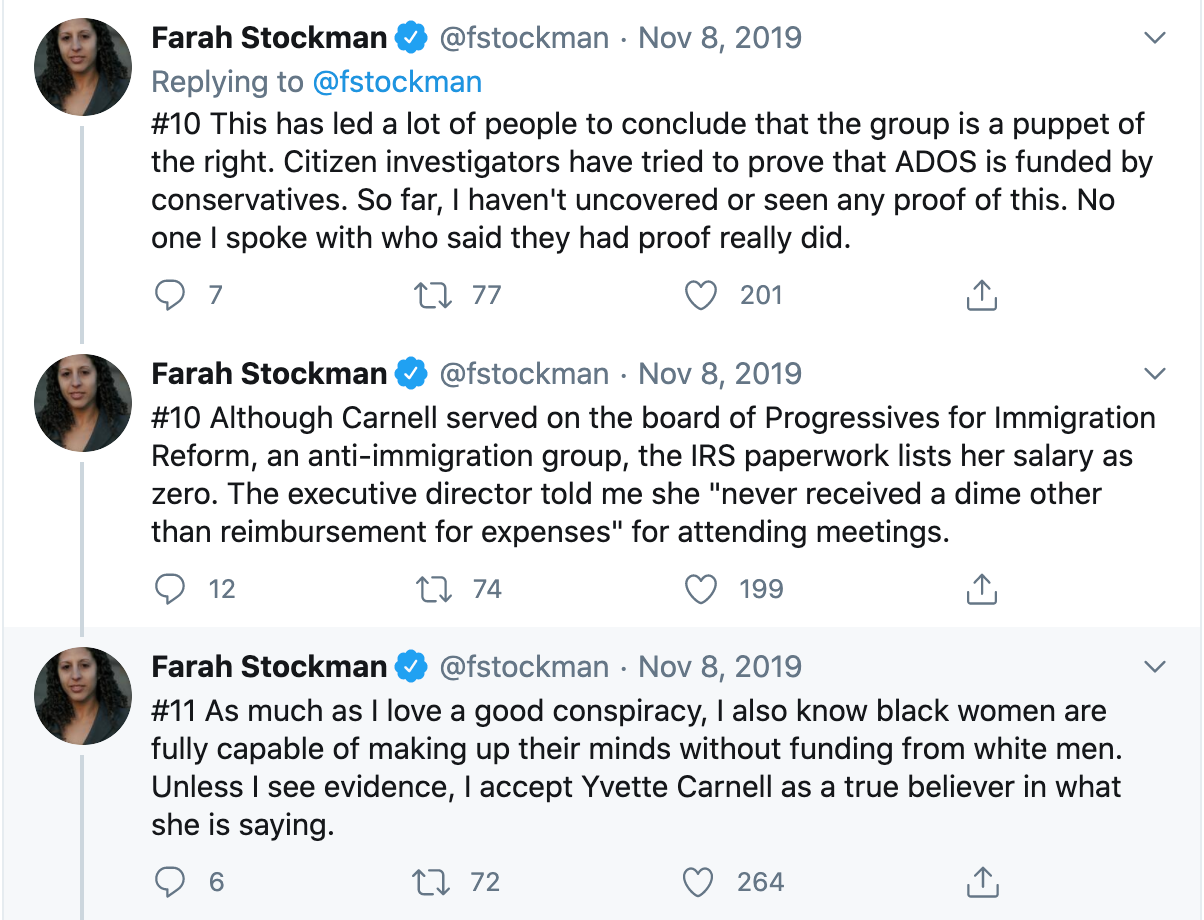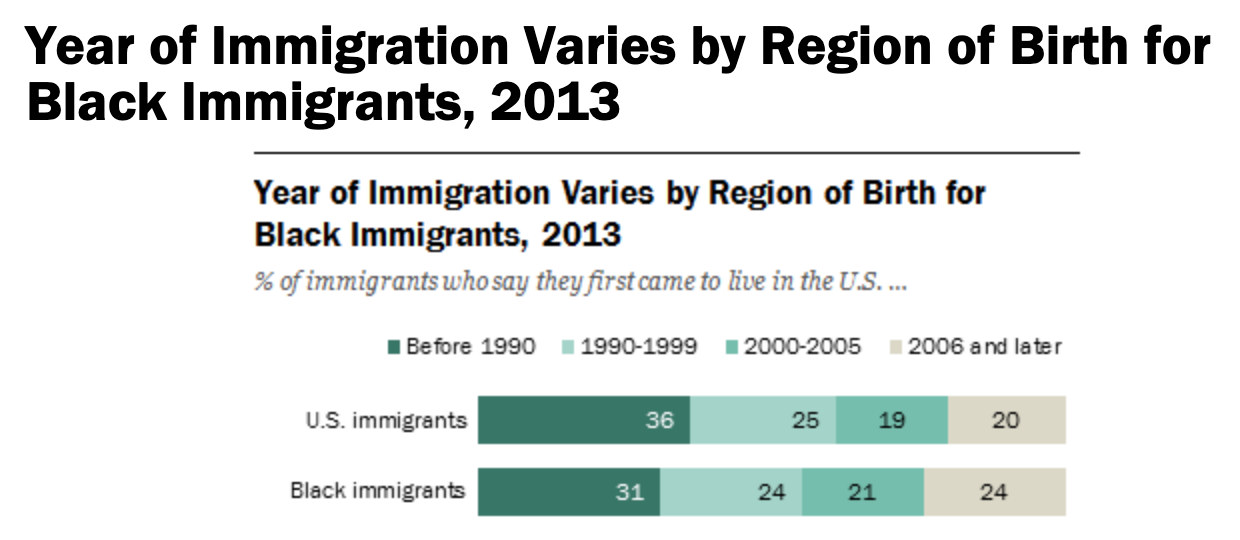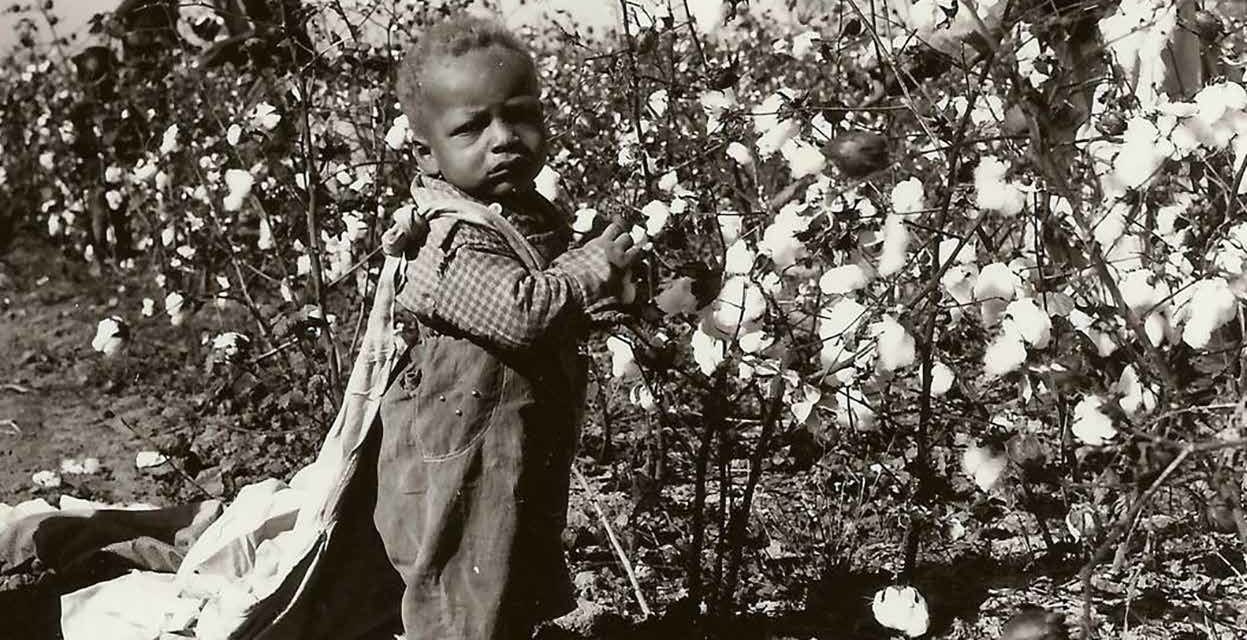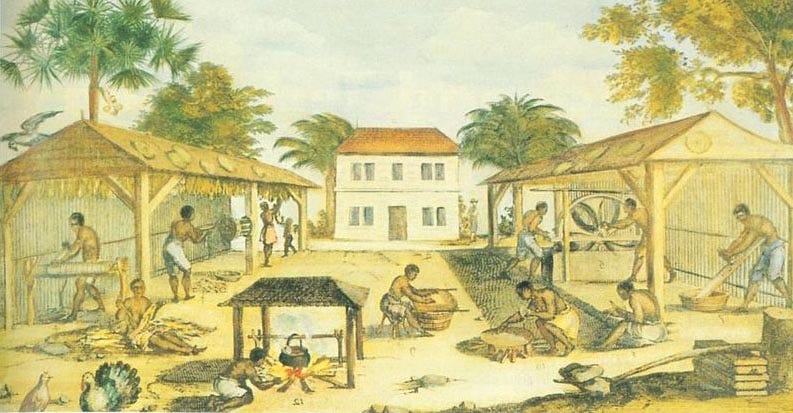J.A.M. Aiwuyor, Tryna “Jam” the #ADOS Movement (Michael R Hicks)
Originally published August 17, 2020 at Medium.

A necessary shout-out to Paul Sowers and AfroBookworm for their previous work responding to libelous and slanderous defamation.
During an August 5 livestream during the Simmons College of Kentucky-sponsored West Louisville Forum, Jessica Ann Mitchell (J.A.M.) Aiwuyor, author of ADOS attack piece disguised as long-form critical analysis, “Understanding the ADOS Movement,” popped in the comments section of the event with a link to a self-published article, “Slavery is Not Our Lineage,” as an attempt to repudiate the featured speakers of the event, Yvette Carnell and Antonio Moore, co-founders of #ADOS. It has been part of an ongoing campaign throughout 2020 by Aiwuyor to attack and delegitimize the efforts of #ADOS. She charges that the #ADOS movement are “xenophobic, anti-african, anti-Black and harmful to the Black community,” a “veil for the erasure of our identity using right wing talking points.” My word!
What we continue to have here, to paraphrase an old prison movie, “is a failure to communicate.”
Aiwuyor manipulates rhetorical tools to give the appearance of legitimacy and fact-checking where it does not exist. The use of statements such as “what journalists and researchers have documented,” suggests that something with an appearance of a fact actually is one. It’s not. Given these “researchers and journalists” have never found any links that #ADOS as an organization are tied to these disinformation networks, simply saying so doesn’t make speculation truth.


It is made worse when subsequent hit-piece articles cite older unsubstantiated ones, as if they have somehow made the untrue true by repetition. It’s irresponsible, it exposes a gross disrespect for your readers, and Aiwuyor has passed “evidence-free editorializing” as research and material fact. Aiwuyor describes herself as a “digital storyteller.” Indeed.
A “scholarly sheen” of a lie is still a lie, just one with more attractive packaging.
Aiwuyor’s criticisms represent one of more than a few over the last couple of years, representative of a deep offense that a group of folk would have the audacity to demand specificity.
There is no doubt that to be Black in America is to experience anti-Black discrimination. That said, there is nothing unreasonable about the ADOS demand to settle-up its centuries-long debts. That said, why allow confusion between the demands to repair double-digit generations of a people who’ve endured targeted oppression and human atrocity, versus people who elected to come to the United States of their own accord in the last twenty years? Nearly half, 45% of American Black immigrants came to the United States after 2000.

It takes a strange energy to frame the ADOS argument of ethnic specificity in the country that their ancestors built and were the wealth for as something hateful, sinister. Aiwuyor’s ADOS criticisms essentially ignore 244 years of American history. Our ancestors built the wealth of this nation. There is a community of American Pan-Africans that scold those that advocate for #ADOS to accept an “Equal Opportunity Blackness” that ignores that history and what our people have endured.


J.A.M. Aiwuyor attempts to present very answerable questions as something unanswerable, or worse, problematic. Sowers is correct. Her excuse of an examination is not rigorous, meaningfully informative or communicative. Where was the effort to actually prove her arguments? What she attempts to present as undoable are not. The criteria that ADOS endorse and as outlined by William Darity and Kirsten Mullen’s “From Here To Equality: Reparations For Black Americans in the Twenty-First Century” are not impossible to acquire. As the enslaved were chattel property, detailed records were kept, and ADOS-focused genealogical research has exploded over the last few decades.
There is an oozing contempt you feel with these criticisms, as if we’re stigmatizing our ancestors, or ourselves, with the demand for specificity and the pursuit of information. The specter of color stigma from white supremacists has been there and may always be. There appears to be a growing need to explore the sense of shame and avoidance that some American Pan-Africanists have about the institution of slavery and how their methods of emotional compensation are a form of extreme task avoidance and fantastical wish casting.
For those who are searching for a greater understanding of these Pan-Africanist “anti-”rebuttals, I suggest these articles:
In Defense of ADOS: A Response to Jessica Aiwuyor
Reading Jessica Aiwuyor’s “Understanding ADOS” and Failing to Understand
Understanding Aiwuyor: Laziness, Lies, and the Clout Bait of Clouding #ADOS
Tales From the Grift: Jessica Aiwuyor’s Ongoing Fictionalization of #ADOS
And They Will Moralize with More Lies: #ADOS Story Time With Jess Aiwuyor
Not a direct connection with Mrs. Aiwuyor but closely related: WHY ARE WRITERS FROM AFRICA DISPARAGING AFRICAN AMERICANS?
ADOS and Insane Claims of Nativism
Using declarative, polemic opinion as fact, followed by blocks of any attempt to respond to such statements is a problem. It’s a cowardly style of attack. Opportunities to debate ideas and build consensus are taken away before there’s a chance to start.

It’s propaganda. “The point, rather, is to simply reveal to that audience the ways in which the propagandist proceeds from a position of total contempt for them — how the propagandist starts from the premise that her audience in fact has no free thinking minds to begin with.”
Jessica Aiwuyor invokes a phantasm of “slave papers.” Really? Framing is everything. Understanding what that means provides guidance as we go, as we encounter any and every new piece of information that comes our way.
The use of such language is placed there to invoke a sense of authoritarian control, something illicit that has to be shunned, a Pandora’s Box that must never be opened. A suggestion that the pursuit of lineage for the sake of establishing an American claim for reparations and a Black Agenda is somehow a concession of inferiority to white supremacy. That is utterly ridiculous.
It is strange for me, as a graduate of Pan-African studies and political science, a traveler to West Africa to study history and culture, and an avid researcher of ADOS, African, Afro-Caribbean and diasporan history, politics, philosophy and culture, to observe what’s happened to the American forms of Pan-Africanism over the last 20 or so years. The “romanticized distortions” of an ideology that frankly, is not one that has momentum in the United States or in the sovereign nation-states on the continent.
Pan-African ideology, at least the way it has manifested itself in American forms via the halls of academe or America’s Black bookstores, has morphed into something more toxic over the decades. There is a seemingly primal outrage around the ADOS demand for specificity as well as the anchoring in Americanness — that our “we’re good, thanks” position is the gloved slap in the face of our ancestors.
American descendants of chattel slavery are not a “lost tribe.” Personally speaking, I’m not opposed to Pan-Africanism conceptually, but the mysticism and pseudo-metaphysical derivatives that have come from it post-COINTELPRO are maddening. Under further consideration, I suggest flipping the criticisms against ADOS and examine certain kinds of modern American Pan-African pursuits as a form of self-hate. Or at least a kind of self-loathing where the stigma of their ancestors’ enslavement is a trauma that must be avoided at all costs. A deep-seated disgust that must be addressed with a form of self-medication to search for a way of life lost for centuries, through cherry-picking the “africanisms” of mostly West African ethnic groups in a ham-handed, pop culture-ish, “Greatest Hits” sort of way of the most entertaining forms to create a new mythology. Unfortunately the results of these constructions do not currently exist in practice in the dozens of nation-states that make up the continent of Africa. It appears to deeply annoy American Pan-Africanists that #ADOS, as a political project, refuse to sell or buy fairy tales as practice.
#ADOS challenges the conventional N’COBRA strategies, at least those from 2000 to the present, of the “why” and “whom” of reparations. Justice claims have to be directed towards a transgressor, and there has to be specificity about the harmed group. At least it does if you have any hope of success with the effort. We reveal the absurdity of an unachievable demand for the United States to foot the bill for global reparations to every person of African descent throughout the diaspora.
#ADOS remain in a state of constant defense. For the last two years, multiple, otherwise disparate interest groups have mischaracterized ADOS’ mission. People approach the ADOS movement with bad-faith smears and misrepresentation, and when they receive pushback for that antagonism from a community of working poor and poor ADOS, these groups then portray the defensive responses as “attacks.”
Some of these interactions result from lying about the #ADOS position on immigration policy as a desire to keep America white. The American white Left have become more interested in securing the benefits of citizenship for undocumented people without finishing the business of doing so for ADOS. It is a profound moral failure that reveals how racism manifests itself on the Left as well as the Right. There’s also the problem of assigning to ADOS phrasing and social media responses from other Black individuals and groups who renounce any connection with our political work. Their rhetoric is not of #ADOS, yet we are accused of it.
It’s outrageous, really. People finding a political effort that is rooted in their collective self-interest encountering lies and half-truths about their place and purpose, they very existence even, having that described as a “swarm” by Aiwuyor is reductive. Dehumanizing. Awful.
Don’t get me started on the fantastical grip of geriatric American Afro-Trekkers looking for their last Big Score via HR40 as currently structured, using HR 40 as a slush fund for the wish-dreams of flying their panther-faced Vibranium Wakanda spaceships back to Africa to retire in utopian bliss, luxed-out in dashikis and Kangols.

This senior Baby Boomer class of former Black Power advocates, many witnesses to the aftermath of state-sanctioned targeted assassination, imprisonment, and political repression, had to craft means of survival from the enforcement arms of the federal government treating their struggle for freedom as threats to national security. I empathize with the necessity of adaptation for survival’s sake against repression from the state, but all forms of adaptation aren’t positive.
ADOS are at the bottom of every socioeconomic indicator in America, no matter where you live. Aiwuyor, along with others, wastes their energy punching down on working poor and poor descendants of American chattel slavery. We as a group wish that they would re-direct their energy from trying to convince others that ADOS are something less-than-human and undeserving and examine the realities of America’s racial wealth gap, then project their future prospects as American citizens as a result.
In addition to reparations for ADOS, there is also the demand for a national Black agenda that will be a positive for American cities where all forms of Black communities, whatever your origins from the diaspora, will benefit. Have our detractors ever considered that ADOS being made socioeconomically whole can better facilitate a substantial Pan-African alliance, that a people being lifted from the bottom of a hierarchy of needs might better be equipped to help and work with others from the African diaspora once they receive their American debts that are owed? That the expenditures demanded from a comprehensive reparations plan would transform American policy? Why are #ADOS under attack versus the exploration of these more relevant questions?
#ADOS as a movement are being charged with dividing something that is not, or ever may have, been together. Or at least the interpretation of what that “togetherness” means has not been something that has socioeconomically worked for ADOS, particularly after 1965. There is a durable claim that the #ADOS movement are primarily bots or fake accounts, one that has never been proven. The next line of argument attempts to scapegoat Yvette Carnell as some Manchurian Candidate of right-winged and/or white-supremacist skullduggery, despite the fact that she is a Howard graduate of political science, the same institution as the current 2020 Democratic Vice-Presidential candidate Kamala Harris, and Carnell worked in Washington, DC for Democratic congresspeople and the Democratic National Committee.
What the ADOS political educational movement refuses to do is be a rubber stamp to the desires of the National African American Reparations Commission (NAARC) and the National Coalitions of Blacks for Reparations in America (N’COBRA). Why would #ADOS ally with a reparations pursuit that was dead in the water until #ADOS brought this issue back into Black American and American consciousness over the last three years? HR40 sat in a coma from 1989 to the present, frozen in committee despite the two(!) instances of Democratic presidents with Democratic majorities in both the House and the Senate during the first two years of their first terms (William Jefferson Clinton and Barack Hussein Obama, of course). The bill went nowhere. Few co-sponsors, no momentum, no support.
These legacy organizations demand that #ADOS kneel in fealty to those who came before. We certainly acknowledge that there is a long history, since the end of the Civil War, in the demand for repair, for compensation. We acknowledge that N’COBRA, as an organization, has been in existence since 1987. We also understand that ADOS as an American socioeconomic group are a bottom caste. We assert that they are guilty of an institutional mission drift that we can no longer abide.
Our ancestors built the wealth of this land. It was our ancestors’ labor and bodies, tortured and treated as chattel in the south and capitalized as financial instruments in the north. We, from our ancestors as the American Descendants of Slavery (ADOS), built the wealth of a nation that facilitated the United States following Great Britain in the Industrial Revolution and needing additional white European labor to man the factories and develop America’s urban cities. That history extended the wealth of America while our ancestors were systematically not only locked out, but punished, quarantined and marginalized every step of the way.
We demand the grace for, and if not allowed it shall seize it anyway, the necessity to legalistically self-identify as a group of American citizens who have had justice repeatedly denied. Ghastly lies about #ADOS supporting eugenics because we challenge shallow constructions about what “Black solidarity” must look like…how are we dehumanizing others?
This political journey for justice is an exercise in self-actualization. Not one where #ADOS are stating that we are better than our African brothers and sisters in the diaspora, but our centuries in America are distinct, our American claim for justice since its Declaration of Independence in 1776 is also distinct and demands particular specificity, and we reserve every right that we must to exercise and actualize that justice claim. We reject the bad-faith gestures, the status quo allowances that other Blacks of the diaspora can claim affinities to the nations where they were born while ADOS are allowed to claim nothing, slandered with the lies of working with Right-Wing white supremacists when we live in an America that operates with this:https://cdn.embedly.com/widgets/media.html?
#ADOS will continue to do what we must, until we extract what we deserve—the American debt that is owed so that we can honor the suffering of our ancestors and provide a future for our descendants, no matter the misinformation, no matter the lies.
We shall not be JAMmed.




